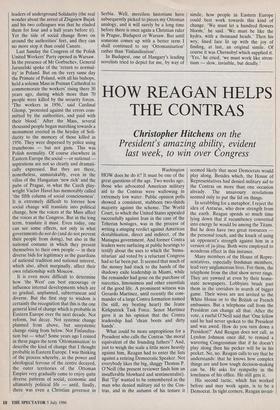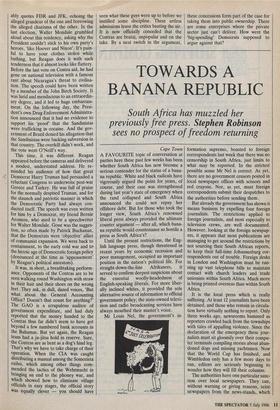HOW REAGAN HELPS THE CONTRAS
Christopher Hitchens on the
President's amazing ability, evident last week, to win over Congress
Washington HOW does he do it? It must be one of the great questions of the age. Two weeks ago, those who advocated American military aid to the Contras were wallowing in extremely low water. Public opinion polls showed a consistent, stubborn two-thirds majority against the scheme. The World Court, to which the United States appealed successfully against Iran in the case of the Teheran hostages, was in the process of writing a stinging verdict against American destablisation, direct and indirect, of the Managua government. And former Contra leaders were surfacing at public hearings to testify about the uses to which the 'huma- nitarian' aid voted by a reluctant Congress had so far been put. It seemed that much of the money had stuck to the hands of the shadowy exile leadership in Miami, while the remainder had gone on the purchase of narcotics, limousiness and other essentials of the good life. A prominent witness was Gerardo Martinez, until recently the com- mander of a large Contra formation named (be still, my beating heart) the Jeane Kirkpatrick Task Force. Senor Martinez gave it as his opinion that the Contra leadership had 'clean boots and dirty hands'.
What could be more unpropitious for a President who calls the Contras 'the moral equivalent of the founding fathers'? And, just to weigh the scale a little more heavily against him, Reagan had to enter the lists against a retiring Democratic Speaker. Not everybody likes the big, shaggy Thomas P. O'Neill (the present reviewer finds him an insufferable blowhard and sentimentalist). But 'Tip' wanted to be remembered as the man who denied military aid to the Con- tras, and in the autumn of his tenure it seemed likely that most Democrats would play along. Besides which, the House of Representatives had denied military aid to the Contras on more than one occasion already. The unsavoury revelations seemed only to put the lid on things.
In scrabbling for a metaphor, I reject the idea of Antaeus, who drew strength from the earth. Reagan spends so much time lying down that if recumbency converted into energy he would be among the Titans. But he does have two great resources the personal touch, and the knack of using an opponent's strength against him in a version of ju-jitsu. Both were employed to wondrous effect in this instance.
Many members of the House of Repre- sentatives, especially freshman members, lead very unglamorous lives. For them, the telephone from the chat show never rings. They are yawned at even by their home- state newspapers. Lobbyists brush past them in the corridors in search of bigger game. Their wives are not invited to the White House or to the British or French embassies. But a telephone call from the President can change all that. After the vote, a rueful O'Neill said that 'One fellow said he had never spoken to the President and was awed. How do you turn down a President?' And Reagan does not call, as Lyndon Johnson once did, to remind a wavering Congressman that if he doesn't play along then his pecker will be in his pocket. No, no. Reagan calls to say that he understands: that he knows how complex things are and how tough decision-making can be. He asks for sympathy in the loneliness of his office. He still gets it.
His second tactic, which has worked before and may work again, is to be a Democrat. In tight corners, Reagan invari- ably quotes FDR and JFK, echoing the alleged grandeur of the one and borrowing the alleged charisma of the other. In the last election, Walter Mondale grumbled aloud about this tendency, asking why the President couldn't stick to his own party's heroes, 'like Hoover and Nixon'. It's pain- ful to have your clothes stolen while bathing, but Reagan does it with such tenderness that it almost looks like flattery. Before the last vote on Contra aid, he had gone on national television with a famous rant about Nicaragua's threat to civilisa- tion. The speech could have been written by a member of the John Birch Society. It was lurid and mendacious to an extraordin- ary degree, and it led to huge embarrass- ment. On the following day, the Presi- dent's own Drug Enforcement Administra- tion announced that it had no evidence to support his 'proof' that the Sandinistas were trafficking in cocaine. And the gov- ernment of Brazil denied his allegation that the Sandinistas were backing subversion in that country. The overkill didn't work, and the vote went O'Neill's way.
This time, it was different. Reagan appeared before the cameras and delivered a modest, understated address. He re- minded his audience of how that great Democrat Harry Truman had persuaded a reluctant Congress to underwrite post-war Greece and Turkey. He was full of praise for the normally despised Truman, and for the staunch and patriotic manner in which the Democratic Party had always con- ducted itself. The speech was even written for him by a Democrat, my friend Bernie Aronson, who used to be a speechwriter for Walter Mondale. Gone was the sugges- tion, so often made by Patrick Buchanan, that the Democrats were 'objective' allies of communist expansion. We were back to containment, to the early cold war and to the heroic age of Democratic foreign policy (denounced at the time as 'appeasement' by Reagan's political ancestors).
It was, in short, a breathtaking perform- ance. Opponents of the Contras are to be seen walking round Washington with straw in their hair and their shoes on the wrong feet. They ask, in dull, dazed voices, 'But what about the General Accounting Office? Doesn't that count for anything?' The GAO is a scrupulous auditor of government expenditure, and had duly reported that the money handed to the Contras thus far didn't seem to have got beyond a few numbered bank accounts in the Bahamas. But yet again, the Reagan team had a ju-jitsu hold in reserve. Sure, • the Contras are as bent as a dog's hind leg. That's why we have to take charge of their operation. When the CIA was caught distributing a manual among the Somozista exiles, which among other things com- mended the tactics of the Wehrmacht in bringing an end to the phoney war, and which showed how to eliminate village officials in easy stages, the official story was equally clever — you should have seen what these guys were up to before we instilled some discipline. These artless admissions leave the critics beating the air. It is now officially conceded that the Contras are brutal, unpopular and on the take. By a neat switch in the argument, these concessions form part of the case for taking them into public ownership. There are some enterprises where the private sector just can't deliver. How were the `big-spending' Democrats supposed to argue against that?



















































 Previous page
Previous page